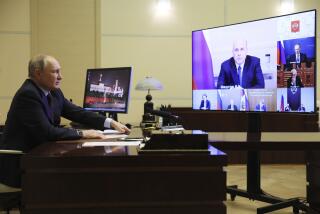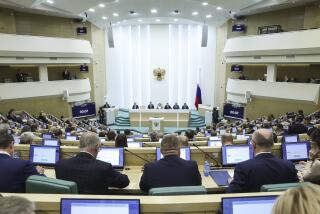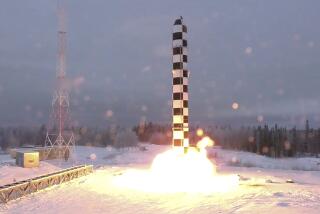Absolutely No Need to Overreact : Washington should maintain ban on nuclear testing despite provocation of Beijing’s test
- Share via
China has broken the informal global moratorium on nuclear testing, and there’s concern that other countries--France could be at the head of the pack--will use the Chinese underground explosion at Lop Nor in the remote Xinjiang Autonomous Region to justify their own return to testing.
President Clinton responded by directing the Energy Department to prepare for a possible resumption of underground testing. That could come by next June. Clinton’s order doesn’t, however, commit the United States to a new round of weapons tests; indeed, the feeling in Congress, which must approve any resumption, seems rightly to favor continuing the U.S. test suspension. But the order also doesn’t improve the atmosphere for reaching agreement on a treaty banning all nuclear tests, talks on which begin in January.
In resuming testing after a year’s hiatus China rejected a personal plea from Clinton and the urgings of a score of other nations. China’s explanation was the same offered by every country that has tested nuclear weapons: It was acting solely in its self-defense. Granted, China lives in a tough neighborhood. Old rivals India and Russia are nuclear powers, onetime ally North Korea is a nuclear weapons wanna-be. But it’s just as likely that China started testing nuclear weapons again in the face of world disapproval precisely to emphasize its familiar policy line that it is an independent great power, free to do what it wants within its own borders and not bound by what others might think.
We hope that the United States doesn’t feel compelled to begin testing its nuclear arsenal again, no matter what China or France might do. So far as can be told there is currently no overriding national security reason for doing so. There are, conversely, good political arguments for sticking with the moratorium.
The Nuclear Non-proliferation Treaty, which expires in 1995, is not without its flaws and loopholes, but it nonetheless remains the most effective international instrument for controlling the spread of nuclear weapons. A conference to extend the NPT is scheduled for next year. At the same time, as noted, negotiations on a comprehensive test ban treaty are scheduled to begin in January. A renewed and, preferably, strengthened NPT as well as a treaty to ban all nuclear tests would help make the world a less threatened, somewhat more stable place. Clinton has said he wants to see a test ban treaty by September, 1996. That goal would be helped significantly if the United States maintains its ban on testing. China’s breaking of the moratorium doesn’t affect the strategic balance or lessen the need to extend the NPT or achieve a test ban treaty. It’s a deplorable action, but there’s no need to overreact to it.
More to Read
Sign up for Essential California
The most important California stories and recommendations in your inbox every morning.
You may occasionally receive promotional content from the Los Angeles Times.











